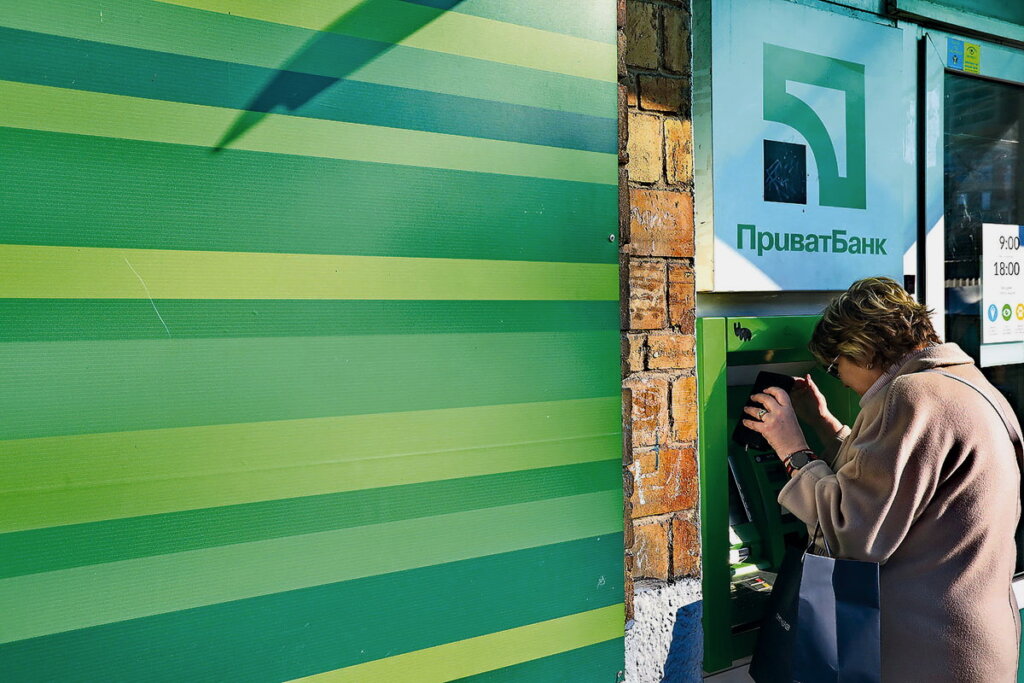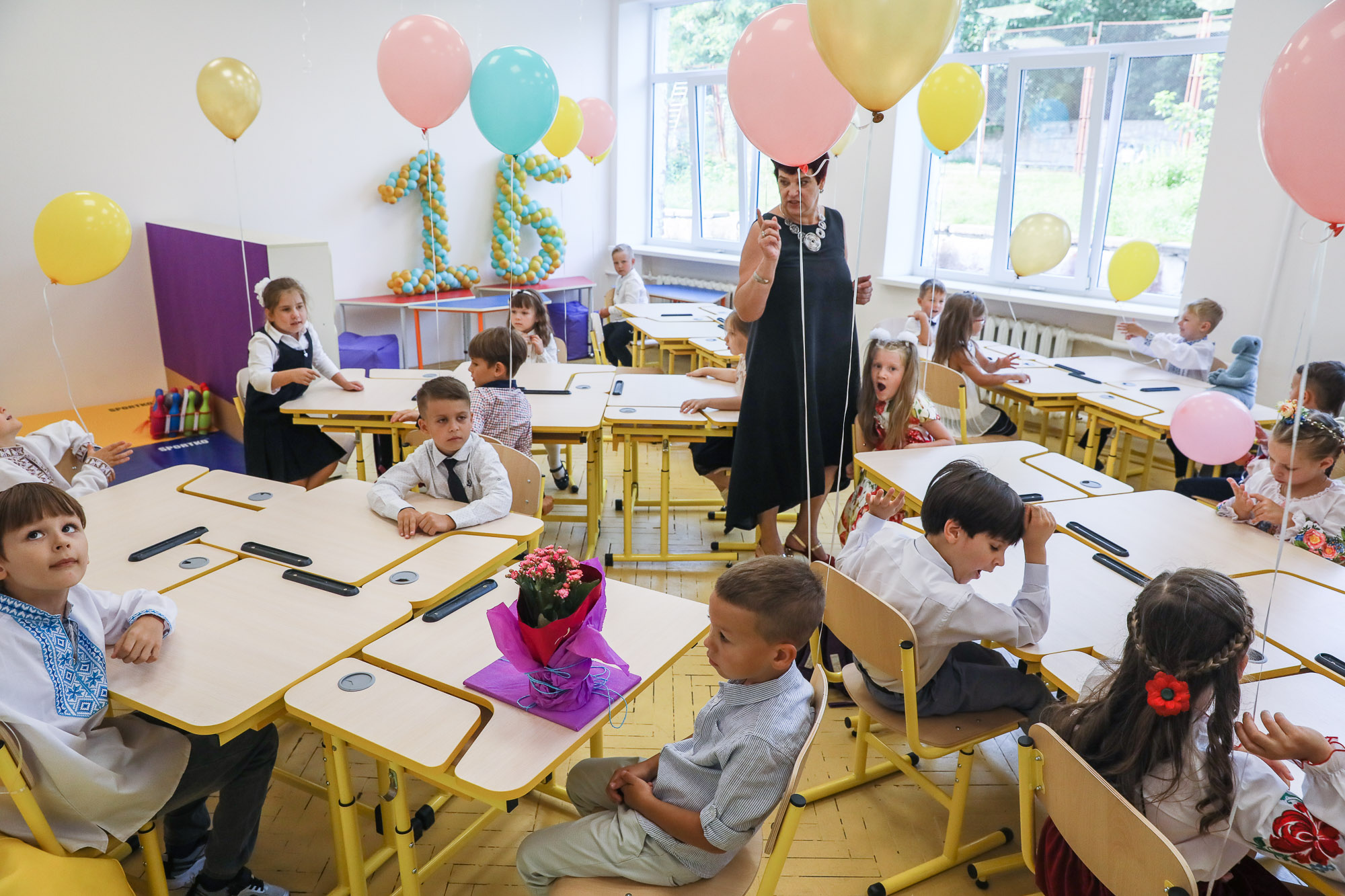Editor’s Note: Our 2019 Doing Business magazine is out. Get a PDF version online or pick up a copy in Kyiv.
Recruited by then-Finance Minister Natalie Jaresko to join her in 2015 and “do something good for your country,” Oksana Markarova remains, leading the ministry that Jaresko left in 2016 and Oleksandr Danylyuk in 2018.
Jaresko and Danylyuk were forced out as finance ministers amid political disputes that started erupting two years after the EuroMaidan Revolution that ousted President Viktor Yanukovych in 2014. Markarova, a technocratic public finance expert with a background in private equity, has thus far managed to navigate those disputes.
“I stayed longer than I thought I would,” the 42-year-old married mother of four children told the Kyiv Post in a wide-ranging interview in her office on a Saturday morning in June.
She’s willing to stay on even longer, but she has her conditions.
“I believe in a European and NATO future for Ukraine. I believe in a market economy and fiscal consolidation,” she said. “If the direction is any different, it’s not something I can support or be a part of.”
She’s prudently preparing for her possible exit, which could come within weeks of a July 21 snap parliamentary election that is expected to be won by President Volodymyr Zelensky’s Servant of the People party. The new ruling coalition will then form a new government by September that may or may not include Markarova in her current role.
“Right now, we in the ministry think we’re at the finish line of this political cycle,” she said.
Before she leaves, Markarova has things she wants to accomplish, including leaving the next government with a fiscally sound 2020 state budget that will spend less than $50 billion — about the size of the budget of the U.S. state of Maryland — next year.
Here are her top four priorities:
Macroeconomic stability
Ukraine’s debt service is enormous at Hr 418 billion to external and internal creditors. It’s more than $15 billion and nearly a third of the state budget in an economy that may officially have only $120 billion in economic output in 2019.
Amid these fiscal landmines, Markarova has to craft budgets that will repay the debt and continue to meet the nation’s enormous social obligations to people, including 12 percent of gross domestic product to pensions.
“Regardless of all the political processes, the country should work without interruptions,” she said. “It’s clear what we need to do to get debt under control and get the country on its feet and continue to grow.”

A woman withdraws money at a PrivatBank branch in Kyiv on April 4, 2019. PrivatBank is the largest state-owned bank in Ukraine, acquired after its former co-owner, oligarch Ihor Kolomoisky, left the bank needing a $5.6 billion taxpayer bailout. (Kostyantyn Chernichkin)
3-year budget plans
She admits the passion she has for longer-term budget planning sounds “technical and boring” to the average person, but defended it as essential to ensuring the financing of reforms while meeting current obligations during transition periods. She also wants the next government not to have to worry about next year’s budget right away.
“The new government will not have a lot of time,” she said. “Sept. 15 is the date when the cabinet has to submit the budget to the parliament.”
Keep international lenders
She favors borrowing from “official lenders” such as the International Monetary Fund, World Bank and European Union, because the loans come for longer terms and cheaper interest rates than on the private market. Of course, the loans have strings attached. “They’re tied with reforms, but it’s a plus, not a minus.”
She said that default on Ukraine’s nearly $80 billion in public debt is out of the question. Already, she said, the nation is making progress in reducing the debt burden. The statistics back her up: The ratio of Ukraine’s total state debt to GDP will decrease to 62 percent by the end of 2019, according to the IMF’s World Economic Outlook, while Markarova wants to cut it to 43 percent by 2022.
Moreover, private investors are responding well to the relative macroeconomic stability in place, which also includes receding inflation to single digits and adequate hard-currency reserves. Ukraine on June 13 issued 1 billion euros worth of Eurobonds at a favorable annual interest rate of 6.75 percent with a seven-year maturity rate.
Timothy Ash, a London-based analyst who knows Ukraine well, said that the Eurobond sale “was very impressive” and shows what the nation can do with “a proper debt management strategy.
Ash said that Markarova “comes across very well with investors. She is direct, efficient, no messing around.”
Another fan is Swedish economist Anders Aslund, a fellow at the Atlantic Council, who told the Kyiv Post: “She enjoys great respect both within the government and in the international community. She sticks to her fiscal goals. She behaves like a civil servant rather than a politician.”

Men play chess in Kyiv’s Taras Shevchenko Park on March 14, 2019. About 12 percent of gross domestic product goes to paying pensions to Ukraine’s retired citizens. (Kostyantyn Chernichkin)
State Fiscal Service reform
Eliminating corruption and inefficiency in the State Fiscal Service, the nation’s gargantuan tax and customs service, has bedeviled many politicians, lawmakers and finance ministers.
The temptation for personal enrichment through graft, smuggling and kickbacks is huge. Two former heads of the state tax service, Roman Nasirov and Myroslav Prodan, have been implicated in criminal financial wrongdoing — accusations both have denied.
An attempt to separate customs from the tax service as part of a broader restructuring has been blocked in court. “The truth is on our side,” said Markarova, who hopes an appellate court will overturn the ruling of the lower-court judges.
“The split of tax and customs into two parts is not the focus or the end of the reform or the reform in and of itself,” she said, but the split would make changes easier to accomplish.
While the split is stalled, Markarova said, much can be done in making the tax service less repressive and more customer-friendly and digital. Among the changes, she said, are reprioritizing tax police investigators to crack down on major money laundering cases and excise tax evasion in cigarettes and alcohol. The tax police used to spawn numerous business complaints for arbitrary and heavy-handed inspections of law-abiding businesses, seemingly designed to extort bribes.
One major reform — the overhaul of the system for issuing value-added tax refunds — took place two years ago, shutting off a big avenue for corruption. Now the process is transparent, predictable and, Markarova said, “irreversible,” unlike in the Yanukovych era, when businesses complained that tax service agents demanded 20 percent kickbacks to receive refunds.
Another bright spot in the State Fiscal Service: Markarova said that she has strong faith in the new head of the tax service, Sergei Verlanov, a former deputy finance minister. “He has a very good track record in business and a very good reputation after his work with the Public Integrity Council involved in the selection of new judges,” she said. “He’s very honest and very capable and a very good tax lawyer.”
Stalled investigations
But another promising change — the creation of a special unit to investigate financial crimes — remains stalled. It would need a law by parliament to get started. There is no consensus, however, on whether the unit should just investigate tax violations and stay under the Finance Ministry or investigate all financial crimes, taking away these powers from all other law enforcement agencies.
“We have been discussing way too long,” Markarova said. “We don’t have a consensus at the moment, unfortunately.”
In the meantime, huge financial crimes — like bank fraud that cost taxpayers at least $20 billion this decade alone — go unpunished.
Courts & rule of law
Just as Ukraine’s courts dealt a blow to State Fiscal Service reforms, judges have also put up obstacles to the privatization of the largest state-owned enterprises — part of a portfolio of more than 1,800 government-owned businesses that are sources of corruption and a fiscal drag.
“The record is very bad in large privatization,” Markarova said. “In 2018, we had reason for optimism. After three years of fighting, we managed to adopt the law that is much better than what we have now. We selected professional advisers to prepare properties to attract real buyers. What did the vested interests do? They started stopping it through the courts. Every time we do something good, we come back to the need for full-fledged judicial reform.”
What needs to be done
Ukraine would not have to borrow so much money — or any money at all — if it could get more people to voluntarily pay taxes, raise money through privatization of state enterprises, end corruption in the tax and customs services, start imposing real property taxes nationwide to benefit local governments, end monopolies in many sectors, create an agricultural land market, sell off more foreclosed assets from banks, raise excise taxes even higher on cigarettes and alcohol, stem the flow of offshore tax evasion and transfer pricing abuses… and more.
Ukraine is making progress in all of these areas, but vested interests in the status quo skillfully block radical changes in the nation’s largely unreformed, distrusted and corrupt courts or through other methods.
When the “vested interests” — a euphemism sometimes used to mean oligarchs — don’t use the courts or other means to block progress, a lot can be accomplished. Markarova points to this year’s success of privatizations of small state enterprises — below the radar of the rich and powerful. In competitive, transparent and well-publicized sales, the state has already raised Hr 1 billion — or $37 million — in the selloffs, she said. In using ProZorro, the online tender system, the prices of some assets “went up three-or-fourfold.”
In other areas, the tobacco industry has “a very strong lobby” to thwart high excise taxes, leaving Ukraine’s cigarettes among the cheapest in Europe and fueling illegal smuggling to other nations.
Abuses in customs and transfer pricing are also being combatted, she said, through greater sharing of information with other countries and Ukraine’s participation in the Multilateral Convention to Implement Tax Treaty Related Measures to Prevent Base Erosion and Profit System, sometimes simply abbreviated as BEPS.
While entire sectors of the economy remain monopolized or oligopolized, she said that the adverse effects can be mitigated through a trifecta of sound public policies — better regulation, an effective Anti-Monopoly Committee of Ukraine and better corporate governance.
Markarova also said that cuts in the payroll tax and income tax (now 22 percent and 18 percent, respectively) have encouraged businesses to pay their employees in “white” salaries — officially declared — rather than hide the payments. When the nation can afford it, she said, she would favor an even lower income tax than the current 18 percent.
Greater transparency and efficiency in public spending, she said, will further encourage Ukrainians to voluntarily pay rather than dodge taxes.
“It’s changing, not as fast as it should,” Markarova said of taxpayer attitudes. “People have to be proud to pay taxes rather than be proud not to pay taxes.”
But, she said, “it’s a two-way street.” Government has to cut corruption and spend taxpayer money efficiently and transparently.
“Transparency is the answer to a lot of problems,” she said.

Children attend the first lesson of the school year in Kyiv’s No. 5 primary school on Sept. 1, 2018. (Volodymyr Petrov)
Troubled banking sector
Ukraine’s economy is still digging itself out from the orgy of bank fraud and bad loans this decade that have cost taxpayers $20 billion and counting, leaving many banks crippled with a portfolio of uncollectable loans and unable to lend money.
Many of the deadbeat loans — or non-performing loans — were issued to owners or insiders before the 2014 change in power, which led to the start of a clean-up of the sector. The National Bank of Ukraine closed half of the nation’s banks — leaving about 90 today. The central bank also imposed stiff new requirements to prevent insider lending and to ensure the institutions had sufficient capital.
“But we have to resolve the old loans,” she said. “Otherwise it’s a toxic part of the bank we keep dragging on and on and on.”
The Deposit Guarantee Fund is selling off seized assets from the closed banks, but not getting anywhere close to the $2.6 billion that is owed to the state treasury. “We know that we will not get the 70 billion hryvnias that the DGF owes to us,” Markarova conceded.
Today, more than half of the sector is owned by the state — overseen by the Ministry of Finance and supervisory boards. Among the largest state-owned banks: PrivatBank, Oschadbank, UkrExImBank, and UkrGasBank. She says they are much better-run now since the creation of new regulations and an independent supervisory board of directors for each institution.
Within five years, the state plans to own less than 24 percent of the banking sector. “It’s achievable,” she said. There are, however, bright spots: Oschadbank, for instance, won a $1.3 billion judgment against Russia for lost assets when the Kremlin seized Crimea in 2014.
But the sector is still not providing the affordable credit needed for the economy to grow more quickly, she said. Not only are interest rates too high, but the risk of lending is also too much for many bankers. And this goes back to the courts, who she said could issue rulings to invalidate loans so that borrowers would not have to repay the bank.
Credit register
Ukraine, however, still needs other features of a Western lending system. One of them is a credit score. Another is a public credit register listing all borrowers who have not repaid their loans. Such a register exists, but the information can be accessed only by other banks, not the general public.
However, for state-owned banks, Markarova “firmly believes” the names of people who are not repaying loans should be public. “The country capitalized them with taxpayer money. The shareholders have the right to know,” she said.
Attracting investment
The numbers that Markarova and the Finance Ministry crunches would be a lot bigger if the nation had more foreign direct investment, which now sits at a paltry $2 billion annually or so for a nation of 42 million people.
Ukraine doesn’t have more investment for two reasons: corruption and lack of rule of law.
“The No. 1 question is judicial reform and rule of law,” she said. “The free and fair judiciary is a must. Look at countries with a high level of investments. They go into two types of countries: they either go to the democracies, market economies where there is a strong judiciary and property rights or they go into horrible places, dictatorships, but where there are guarantees and you have to deal with just one person.”
Ukraine, as a fledgling — or “not free and fair” — democracy as Markarova put it, “is the worst place for investors. Investors need certainty. Uncertainty scares investors. They have a lot of countries to choose from.”
Ukraine, nonetheless, has made some progress in these areas — for instance, curtailing corruption of the road police at the street level while remaking the Supreme Court into a more reliable dispenser of justice.
The problems remain with the lower courts, she said, and such agencies as the Security Service of Ukraine, or SBU, a 40,000-member law enforcement body with tremendous powers as the successor agency to the Soviet KGB. It needs to narrow its focus to intelligence and counter-terrorism, she said, rather than investigating “economic crimes” of regular businesses, as it does now. “It is going to be the first test to see what is done in the SBU,” she said.
